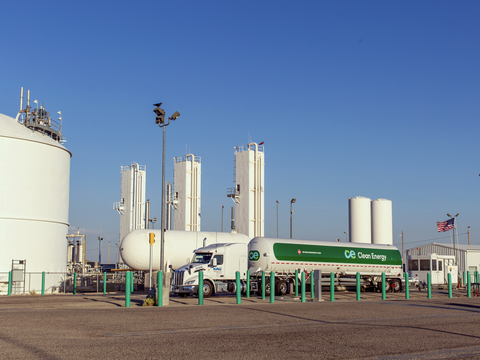Clean Energy Fuels Corp. (NASDAQ: CLNE), the largest provider of the cleanest fuel for the transportation market, announced that construction of a third production train at its liquefied natural gas (LNG) plant in Boron, California, has been completed, increasing the plant’s volume capacity by 50 percent. Already the largest plant of its kind in the Southwest U.S., the Boron plant now has the capacity to produce up to 270,000 gallons of cleaner-burning LNG every day. The addition of the third production train will allow the supply to meet the growing demand for bulk LNG by customers looking to decarbonize everything from city buses to large container ships.
This press release features multimedia. View the full release here: https://www.businesswire.com/news/home/20240611588001/en/

Clean Energy Boron LNG Plant's 3 Production Trains (Photo: Business Wire)
An important Clean Energy customer, Pasha Hawaii, is now operating three LNG-powered container ships out of the Ports of Long Beach, Oakland and Honolulu. The volume of fuel that the MV George II, MV George III and MV Janet Marie has grown from 526,486 gallons of LNG for the month of August 2022 when Pasha Hawaii’s first LNG-powered ship was commissioned, to 2,115,726 gallons in April 2024.
Not only can fueling with LNG significantly and immediately improve air quality around the ports, which often have some of the worst air pollution in the country, but by operating on LNG, all three Pasha Hawaii ships surpass the International Maritime Organizations (IMO) 2030 standards for ocean vessels with zero sulfur emissions. Pasha’s LNG ships also obtain a 90 percent reduction in nitrogen oxide and 25 percent reduction in carbon dioxide compared to ships running on traditional fuels.
“Pasha Hawaii’s leadership in sustainable shipping has grown with the commissioning of their third LNG-powered ship. By growing their LNG-fleet, they are reducing pollution and carbon emissions around the ports and showing that LNG can work as effectively as their fuel oil counterpart. The addition of more LNG production at our Boron facility will give us the capacity to allow other customers the ability to decarbonize their operations,” said Greg Roche, vice president at Clean Energy.
“We are dedicated to employing today’s most innovative resources and technologies to ensure the cleanest operations possible in the communities we serve,” said George Pasha, IV, President and CEO, The Pasha Group. “We are proud to continue our partnership with Clean Energy to efficiently bunker and fuel our three LNG-powered container ships in the Pasha Hawaii fleet, which are among the most technologically advanced and environmentally friendly vessels to serve Hawaii and California.”
About Clean Energy
Clean Energy Fuels Corp. is the country’s largest provider of the cleanest fuel for the transportation market. Our mission is to decarbonize transportation through the development and delivery of renewable natural gas (RNG), a sustainable fuel derived by capturing methane from organic waste. Clean Energy allows thousands of vehicles, from airport shuttles to city buses to waste and heavy-duty trucks, to reduce their amount of climate-harming greenhouse gas. We operate a vast network of fueling stations across the U.S. and Canada as well as RNG production facilities at dairy farms. Visit www.cleanenergyfuels.com and follow @ce_renewables on X and LinkedIn.
Forward-Looking Statements
This news release contains forward-looking statements within the meaning of Section 27A of the Securities Act of 1933 and Section 21E of the Securities Exchange Act of 1934 that involve risks, uncertainties and assumptions, including without limitation statements about: the amounts and timing of natural gas expected to be produced or consumed; the timing and scope of construction, maintenance, and other projects; the characteristics and performance of natural gas engines and fuels; the environmental and other benefits of Clean Energy’s fuels; the availability of environmental, tax and other government regulations, programs and incentives; and the impacts of legislative and regulatory developments. Actual results and the timing of events could differ materially from those anticipated in these forward-looking statements. The forward-looking statements made herein speak only as of the date of this press release and, unless otherwise required by law, Clean Energy undertakes no obligation to publicly update such forward-looking statements to reflect subsequent events or circumstances. Additionally, the reports and other documents Clean Energy files with the SEC (available at www.sec.gov) contain risk factors, which may cause actual results to differ materially from the forward-looking statements contained in this news release.
View source version on businesswire.com: https://www.businesswire.com/news/home/20240611588001/en/
Contacts
Media Contact:
Kimberly Fleer
1-949-437-1447
Kimberly.Fleer@cleanenergyfuels.com
Investor Contact:
Thomas Driscoll
1-949-437-1191
Thomas.Driscoll@cleanenergyfuels.com
